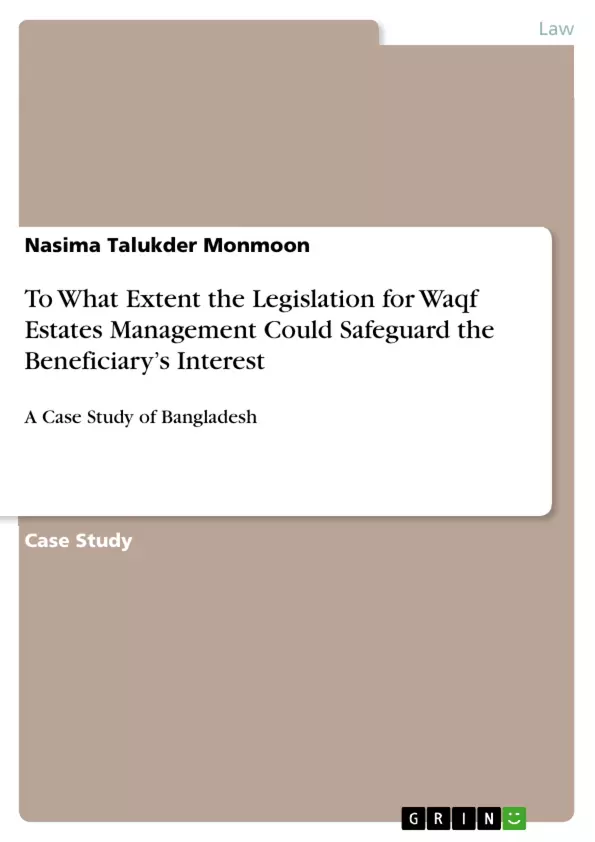According to the Mohammedans law, an unchallengeable religious endowment of any property for any charity, or religious purposes, or to secure the benefit of the property for the future generation or to the human being is called Waqf and it has long practice in Bangladesh. For the better management of Waqfs or religion endowments for charity, the Government of Bangladesh has introduced new law by amending the previous Acts and Ordinance.
The new law still has some limitation that resulted all over the country, there are huge areas of Waqf estates those have already gone under possession of social elites, political clowns, and even governmental agencies. This study identifies that the new law provided special emphasis on the welfare and interest of the Waqf beneficiaries by transferring property that is a major drawback. It recommends alternative funding rather than property transfer or sell-out, prevents illegal possession, training for the administrators.
Inhaltsverzeichnis (Table of Contents)
- PROBLEM STATEMENT
- Introduction:
- Background of the Problem:
- Research Questions and Objectives:
- METHODOLOGY OF THE STUDY:
- Review Strategy
- Research Method:
- LITERATURE REVIEW
- Waqf:
- History of Waqf and the Islamic Jurisprudence
- Chronological Development of Waqf Law in Bangladesh
- Core Content of the New Act 2013:
- DISCUSSION & FINDINGS
- Waqf Ordinance 1962 & Waqfs Special Provisions Act 2013:
- Unregistered Waqf Estates:
Zielsetzung und Themenschwerpunkte (Objectives and Key Themes)
This study examines the effectiveness of the Waqfs (Transfer and Development of Property) Special Provisions Act, 2013 in Bangladesh. The objective is to analyze the new legislation's ability to safeguard the interests of Waqf beneficiaries and address historical issues of mismanagement and illegal transfers of Waqf estates.
- Legal review of the Waqfs (Transfer and Development of Property) Special Provisions Act, 2013
- Analysis of the law's effectiveness in protecting beneficiary interests
- Comparison with previous legislation and its limitations
- Investigation of the impact of the new law on the management and development of Waqf estates
- Examination of challenges and opportunities for ensuring the sustainable management of Waqf estates
Zusammenfassung der Kapitel (Chapter Summaries)
The study begins by introducing the problem statement and providing background information on the historical context of Waqf in Bangladesh. The current state of Waqf estates and the legislation governing them are outlined, highlighting the issues of mismanagement and illegal transfers.
The methodology section discusses the research strategy and methods employed in the study. The primary focus is on a systematic legal review of the Waqfs (Transfer and Development of Property) Special Provisions Act, 2013, drawing upon secondary research sources.
The literature review delves into the conceptual framework of Waqf, its historical development in Bangladesh, and the core content of the new Act of 2013. The study explores the historical context of Waqf and its evolution through various laws and ordinances.
The discussion and findings section presents an analysis of the Waqfs (Transfer and Development of Property) Special Provisions Act, 2013. It compares the new law with the previous legislation, highlighting the strengths and weaknesses of both. The study also explores the impact of the Act on the management of Waqf estates, focusing on the issue of unregistered Waqf estates.
Schlüsselwörter (Keywords)
This research focuses on the management and development of Waqf estates in Bangladesh. Key concepts include Waqf property, Waqf estates, transfer of Waqfs properties, special provisions for Waqf, the Waqfs (Transfer and Development of Property) Special Provisions Act, beneficiary interests, and legal frameworks. The study explores the impact of the Act on ensuring the sustainable management of Waqf estates.
Frequently Asked Questions
What is 'Waqf' in the context of Bangladesh?
Waqf is a religious endowment of property for charity or religious purposes under Islamic law, intended to benefit future generations or humanity.
What is the purpose of the New Act 2013?
The Waqfs Special Provisions Act 2013 was introduced to improve the management of endowments and safeguard the interests of beneficiaries against illegal possession.
Why is illegal possession of Waqf estates a problem?
Many Waqf areas have been taken over by social elites or political figures, leading to a loss of resources intended for charitable welfare.
What are the limitations of the current law?
The study identifies drawbacks in how property is transferred and suggests that the legal framework still allows for mismanagement by certain agencies.
What does the study recommend for better management?
It recommends alternative funding methods, better training for administrators, and stricter measures to prevent the illegal sale or transfer of property.
- Arbeit zitieren
- Nasima Talukder Monmoon (Autor:in), 2015, To What Extent the Legislation for Waqf Estates Management Could Safeguard the Beneficiary’s Interest, München, GRIN Verlag, https://www.grin.com/document/613551



